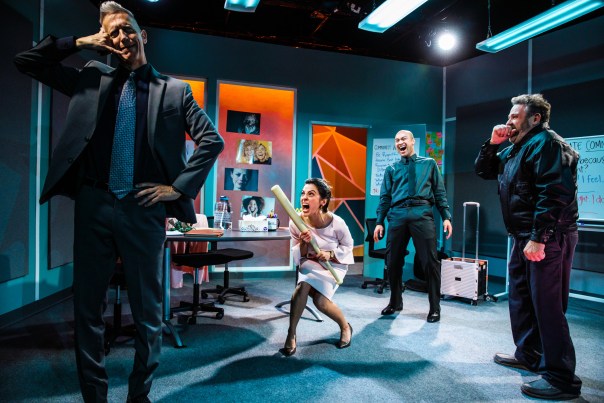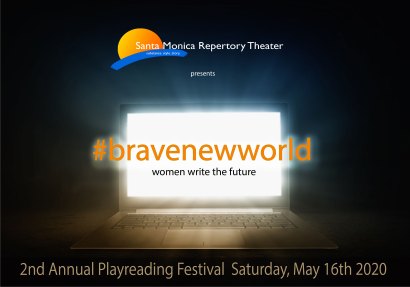I first got to know June and her writing as we were working on new plays together as part of The Vagrancy’s 2020-2021 Writers’ Group (though she had been involved with several Vagrancy productions before joining the Writers’ Group). Reading her pages that year, I was continually struck by her ability to write dialogue that felt wholly grounded and natural while placing her characters in situations that allowed their words to transcend the scenes, thereby always speaking to larger issues and ideas. “Blue”—June’s engrossing two-hander currently playing at Rogue Machine’s Henry Murray Stage—is a perfect example of this skill. With an knack for stripping down the many layers of personal identity while exposing the underbelly of national identity, “Blue” is a unique theatrical production that gives audience members the experience of peering behind the closed doors of the LAPD—with a few revelations about human nature along the way.
Kat Vondy: When we were writing plays together as part of The Vagrancy’s Writers’ Group, there was a very specific structure and schedule involved with the plays we developed there, with new pages due every two weeks over a period of seven months and a few workshops along the way. How does that compare to your writing process in general, and for Blue in particular? Do you tend to dash out a full draft over a weekend, spread the writing out over a longer period of time, or does it depend on the project?
June Carryl: The structure at Echo Lab where I had the chance to write Blue was a meeting once a week with two moderators, the incredible Hannah Wolf and Brian Otano. There were nine of us and we shared a few pages from one play. We’d sign up and had six-to eight weeks to develop pages. My process is kinda all over the place, honestly, depending on the play. I’ve started working with a character biography (who the main players are, especially the protagonist, what they want versus what they need, what their wounds are) and then just fly by the seat of my pants. With Blue I knew the first scene right away and so had to go back to do the character outline. It evolved over time as I was pointed to the need for a deeper relationship between Parker and Sully by the two wonderful directors who shepherded the workshops and a reading down at Curtis Theater, Michael Matthews and Ryan Bergmann.

KV: In addition to being a playwright, you’re also an accomplished director and actor. How do your experiences in those areas inform your writing?
JC: I’m always learning a little more about storytelling from doing the other two things. Character development and how language fits (or doesn’t) in an actor’s mouth, clarity of intention all come from acting while focusing action even if I’m not always clear about why consciously something is happening I get from directing. It’s really fun. I’m really always learning.
KV: In Rogue Machine’s production of Blue, the theatrical space is so intimate and immersive that it’s easy for the audience to suspend their disbelief and forget they’re watching a performance; the audience has the experience of being a fly on the wall of an actual interrogation. This sense is heightened because the play is one unbroken scene that plays out in real time. Did you always conceive of Blue in this way, or were there earlier iterations of the play that had scene breaks and dealt with the passage of time differently?
JC: Credit Michael Matthews, my amazing director, with how that space came to be and Rogue Machine just ran with it. I’m so grateful he said yes. The play has never had scene breaks and was always conceived of as happening in a single scene in real time.

KV: In some ways, Blue feels like a companion piece to the remount of Twilight: Los Angeles, 1992 that was just at the Mark Taper Forum. Both productions highlight the fact that police violence against people of color continues to plague our country: Twilight by recounting a piece of history from over thirty years ago, and Blue by telling a contemporary story that incorporates recent national events. The shows bring into focus a pattern of racism that has not changed in the decades between the 1992 LA Uprising and today.
While thinking about Blue, I was struck by the way that the conversation between LaRhonda and Sully keeps circling back to the same concepts; both characters repeatedly return to certain topics in efforts to continually angle for different responses.
To me, there’s a way in which the structure of Blue echoes the structure of our history: being stuck in a pattern that we can’t (or won’t) break free of. You also explored the theme of patterns in the play you wrote for The Vagrancy, N*gga B*tch. How do you think about patterns and repetition in a storytelling context? What do you think audiences can learn by examining patterns and repetition?
JC: There’s this tick in American culture where we broach a place of change, a watershed moment, and rather than breaking through, we revert to nostalgia and a looking back, usually to the 50s. It’s incredibly annoying. Not that change doesn’t happen. It does, but we are constantly on repeat. The hope is that in the story the characters are initially locked in a repetition, look at the thing in question from one angle, then another, then still another and that the audience recognizes its own patterns and breaks that pattern because to repeat it once more is to remain in stasis, to fail. I never really thought out loud why I do it. It’s kind of an obsession.
KV: We were scheduled to have a Vagrancy Writers’ Group meeting on January 6, 2021—the day of the Capitol Insurrection—and I remember wondering whether it was even possible to access a creative frame of mind given what was happening in DC. The situation was leaving so many people distraught and stunned that it was difficult to focus on anything else. In Blue, the Capitol Insurrection comes to have a particular significance as we get deeper into the story; as such, it feels as if you were able to transform something that was initially a creative barrier into part of your creative work. Struggling to make art while grappling with the weight of disturbing world events is an issue that I think many creative people contend with. Do you have strategies that help you navigate this challenge?

JC: Writing itself is my strategy. I journal every day now, have for a long while. It’s this info dump. Whatever obsession or gripe I’m grappling with I just download for three pages. It just really helps. And the great thing about writing plays is that you can break things down and look at them, at what you think, at what is and isn’t true, and you can decide what your reaction is; so you’re not just feeling helpless or enraged. You can engage. It’s really therapeutic.
KV: Do you have a specific audience member (or members) in mind when you write?
JC: I don’t quite know what that means. I kinda write to talk to anyone who’ll listen. One of the most gratifying things anyone has ever said to me is that I said something in the play that they were feeling and didn’t have the words for. That makes all the stress and self-judgment worth it.
KV: Is there anyone (dead or alive, real or fictional) you’d like to share your work with who hasn’t yet had the opportunity to see or read it?
JC: I wish my mom were alive to see my work. I was supposed to be a lawyer and have tooootally gotten away from that and quite happily. She was always proud of me—I found out she wanted my brother, sister, and me to be happy whatever we chose to do with our lives. I was the quiet one. t would be amazing if she could see how I turned out.
KV: What are you reading/watching right now? Any recommendations for books or shows (on film or stage) that we shouldn’t miss?
JC: I have The Amazing World of Gumball seasons 1 through 3 on repeat. It’s on Hulu. It’s a cartoon about a blue cat, his adopted brother, a goldfish, his sister who is a pink bunny like his dad and his mom who is also a blue cat. Before they decided to make him jaded in season four it was just this hilarious look at 7th graders—just in that in-between place of still being kids and having to contend with he world with kid logic. The first three seasons are incredible and hilarious.
I’m also reading Wilson Harris—slowly. He was a Guyanese author (I’m Guyanese on my mom’s side), utterly brilliant, totally over my head and absolutely worth it, I think, though half the time I literally no idea what he’s talking about. I’m also getting ready to read The Emperor’s Babe by Bernadine Evaristo.
KV: What are your hopes for the future of theater in LA? What would you like to hold onto, and what would you like to change?
JC: I really want theater to make good on the last two years of promising to share the stage with people of color. Workshops are great, genuinely great and a gift; but to see that gift translate into actual PRODUCTIONS rather than just throwing dollars at us and bailing when it comes to sustained support and full production is paramount. What I loved about getting to work with the Vagrancy is that dedication is there. The point is to put the plays up, to support getting the plays up elsewhere when y’all can’t do it yourselves. More theaters like Vagrancy. That’s my hope for the future of LA Theater.
June Carryl’s “Blue” is now playing through Sunday, May 14th at Rogue Machine’s Henry Murray Stage. Tickets are available here. The Vagrancy will present Blossoming 2023, featuring new works by LA playwrights Jennifer Bobiwash, Natalie Camuñas, Anna Fox, and Katherine Vondy, from May 19-23; check out The Vagrancy’s website next month for more info.





































